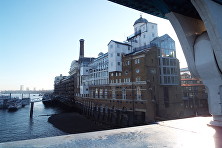
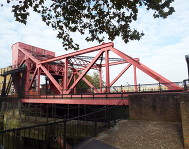
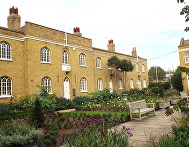
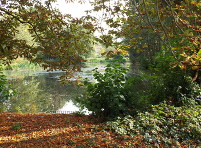
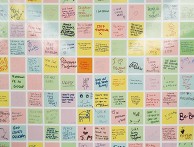
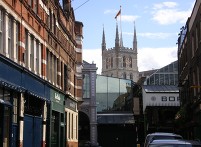
Exploring Southwark and discovering its history


Bevingtons and Sons / Neckinger Mills
Neckinger Mills in Abbey Street is a solid reminder of Bermondsey’s past as the centre of the leather trade in London and in particular the firm of Bevingtons and Sons, one of the leading companies who grew from modest beginnings at the beginning of the 19th century into an internationally renowned company. The building is Grade II listed and built in 1864 on a footprint defined by the Greenwich to London railway line that had divided and cut through Bevingtons’ works in the 1830s.
The Bevington family were Quakers and records show that in 1660 William Bevington was a tanner in the village of Ettington near Stratford upon Avon as was his son John. John’s son Samuel at the age of 13 was sent to London and apprenticed to Mr Peck, Master of the Leathersellers Company. He remained in London and set up a company based in Gracechurch Street that imported lamb and kid skins from Italy which he sold on to dressers in Yeovil where his son, also named Samuel, was based. Samuel Senior died in 1800 and the younger Samuel then moved to London and leased the six acre Neckinger Mills, previously a paper factory.
Samuel was joined in the business by his brothers Henry and Timothy who were in turn succeeded by their sons. John Buckingham Bevington became the leader of that generation and was succeeded by his son Colonel Samuel Bourne Bevington who became the first mayor for the Metropolitan Borough of Bermondsey in 1900 and carried out philanthropic works to help those less fortunate. He died in 1907 and a statue erected to him in Tooley Street in 1911.
Though Bevingtons and Sons’ reputation mainly rests on their production of light, soft leathers for gloves and shoes, they produced and dealt in a wide range of leathers. Their stock book of 1838 shows the variety of skins held: white leather lambs, Cape sheep and goats, Moroccos, skivers, roans, calf, German, seal skins and deer skins. They commenced the manufacture of gloves in 1848 and a little later had a rug leather department, a hat leather department and a coach and harness department. In addition to producing their own leather, they imported leather from many overseas countries not only for their own use but also for resale. In addition to the Neckinger Mills site, they had a warehouse in Cannon Street and later one in St Thomas’ Street.
Part of the works were moved to Dartford, Kent in 1935 and the site to the west of the railway line sold to Bermondsey Council where the Neckinger Estate was built in 1938. Neckinger Mills remained as head office but it became increasingly uneconomical to run and was sold in 1978. The company moved to Leicester and the vacated building converted into live-work apartments.
Bevingtons’ Specialist Leathers are now a division of Milton Leicester Ltd and supply hand-selected leathers to organ builders, restorers, designers and craftsmen which are used in the manufacture of musical instruments, falconry, masonics, specialist garments, book-binding and orthopaedics.
(Click for a clearer view)
Web discoveries
- UK Casino Not On Gamstop
- UK Casino Not On Gamstop
- Non Gamstop Casino
- Casinos Not On Gamstop
- Non Gamstop Casinos
- Non Gamstop Casinos
- Non Gamstop Casino
- Casinos Not On Gamstop
- Casino Sites Not On Gamstop
- Slots Not On Gamstop
- Casinos Not On Gamstop
- UK Betting Sites Not On Gamstop
- UK Casino Not On Gamstop
- Best Non Gamstop Casinos
- Betting Sites
- Non Gamstop Casino Sites UK
- Best Non Gamstop Casinos
- Non Gamstop Casino
- Casinos Not On Gamstop
- Non Gamstop Casino Sites UK
- Horse Racing Betting